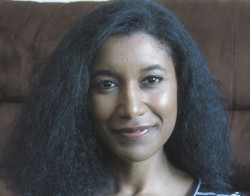
Carolyn Roberts is a Ph.D. Candidate at Harvard University. In 2015-2016, she was a Dissertation Writing Fellow of the Consortium.
From 2015-2016 I had the privilege of spending the academic year as a Dissertation Writing Fellow at the Consortium for the History of Science, Technology, and Medicine. The nine-month fellowship allowed me to complete several dissertation chapters, and the stimulating intellectual community at the center has left an indelible mark on the project. Topics related to ecology, pharmacy, environmental history, and philosophy took new form in my writing and thinking. It was simply an invaluable experience.
I study the history of medicine in the context of the largest, coerced oceanic migration in human history – the transatlantic slave trade. Surprisingly, the topic of medicine has been little studied in the context of British slave trading. Other than brief references to slave ship surgeons, medicine has largely eluded sustained historical inquiry. Studies of mortality in the slave trade, which represent one of the long-standing trends in the historiography, are largely detached from thick descriptions of the theory, practice, and culture of medicine. Yet, this new form of seaborne human commerce, this theft of bodies, was continually faced with loss, destruction, violence, scarcity, and death. Food shortages, high levels of morbidity and mortality, permanent disabilities, and brutal forms of violence were part of the everyday rhythms of the slave trade, and so, too, were concerns related to medicine, health, and healing. One response to the ongoing health crises and destruction of human life was the use of African and European pharmacy, surgery, and herbalism.
My dissertation, “Apothecary, Surgeon, Doctress, Slave: African and European Medicine in the British Slave Trade,” explores the pharmaceutical, surgical, and ethnobotanical dimensions of British slave trading from 1660-1807. I use an extensive multilingual source base largely comprised of slave trade merchants’ records, medical treatises, natural histories, and travel narratives, to study the fragments and traces left by a diverse group of curers scattered throughout the late seventeenth and eighteenth centuries. Because of their knowledge of pharmacy, surgery, and herbalism, these largely anonymous African and European women and men, both enslaved and free, were mobilized to manage the harrowing physical, emotional, and social disorders of the slave trade. In apothecary shops in British port cities, savannah communities in the Kongo, slave factories in the West African coastal plains, and the disease-ridden holds of slave ships, these individuals made medicines, performed surgery, and intervened in some of the most volatile and vulnerable moments in people’s lives. Their intercultural therapeutic practices forged a hybrid medical culture in Atlantic Africa that took root, in new forms, in the Americas.
In the study, I pivot between two modes of analysis. I examine the intimate scenes between sufferers and curers, and the large-scale economic, social, and medical trends and transformations of which they were a part. At the more granular, experiential level, I tease apart the many layers of social and cultural meaning that were embedded in illness events from the perspective of patients and practitioners. Scurvy, bloody stools, worm infestation, smallpox, amputated limbs, venereal disease, blindness, and suicidal desire turned merchants, mariners, and slaves into congeries of the walking wounded. By probing into the illness experience, I show the myriad ways in which African and European cognitive frameworks, cosmological orientations, cultural traditions, and social norms were upended in the lives of sufferers and curers. At this level of analysis, I use the sick body as a new point of departure for telling the story of the slave trade and the lives and livelihoods that were made and unmade in the process.
Yet, the phenomenon of sickness and its cure had broader implications. Moving beyond festering wounds and bodily secretions, I examine how pharmaceutical, surgical, and ethnobotanical dimensions of the slave trade impacted wider movements in the Atlantic world. The global drugs industry, the development of the surgical profession, and the accumulation of new knowledge in natural history and botany were bolstered from the knowledge and labor of African and European curers in the slave trade. I trace these influences by studying the personal and institutional networks in which these medical practitioners were embedded. Anonymous West African healers on the Gold Coast, for example, contributed medicinal plant knowledge to the Royal Society’s Philosophical Transactions. In many cases, these largely anonymous African and European women and men, enslaved and free, never knew how their daily medical labors – their successes and their failures, their healing and their harming – contributed to the modernizing impulses of medicine at work in the late seventeenth and eighteenth centuries.
When I began the 2015-2016 academic year as a dissertation writing fellow at the Consortium, there were still areas of my project that remained unclear. The dissertation description that I have just outlined is a tangible outgrowth of the fellowship. One of the tremendous gifts of the Consortium is the balance the fellows are given between being independent scholars as well as part of a stimulating intellectual community. Informal office conversations, lunchtime brown bag sessions, special conferences, and lectures thrust me into lively exchanges where I was able to learn a great deal about a diverse array of topics. It was so beneficial to spend time thinking about the environment of near space, Hawaiian sugar plantations, yellow fever pandemics, twentieth-century consumer marketing technologies, Indian pharmacopoeias, and androids. The questions these topics prompted and the discussions that ensued prompted new ways of thinking. The interdisciplinary nature of my dissertation was given new depth by being in conversation with environmental historians, philosophers of science, and historians of biology and physics.
I am enormously grateful to the Consortium office staff and the other fellows who were part of this journey and whose energy, passion, and brilliance inspired my writing. The time and space provided by the fellowship was invaluable as it allowed me to move the dissertation into its final stage. The Consortium has left its imprint upon the story that I am telling, and it is, truly, much better for it.